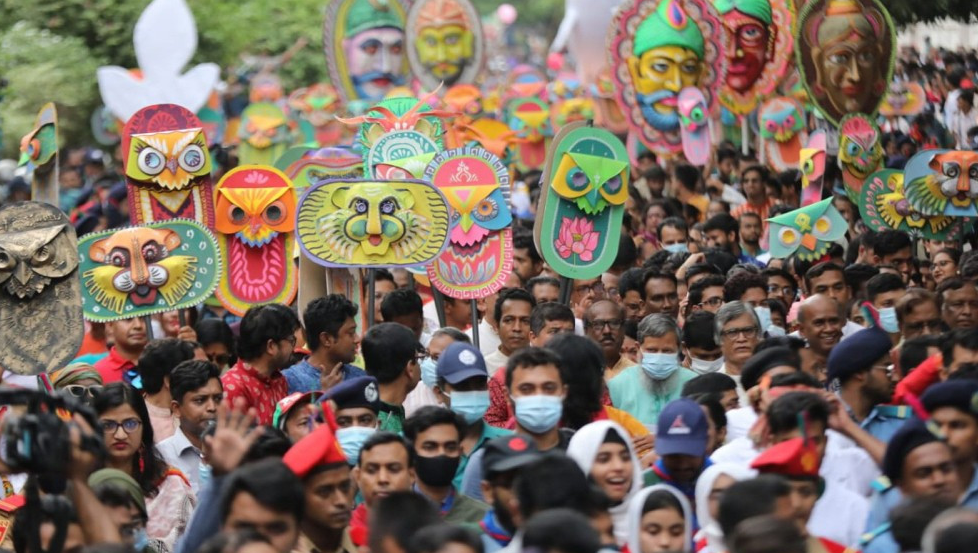Pohela Boishakh is a national festival that is celebrated in Bangladesh to mark the beginning of the Bengali New Year. Hence rightly called the Bangladesh National Festival. It is a significant cultural event that symbolizes the renewal of life and the arrival of spring. Pohela Boishakh is celebrated on April 14th every year, and it is a day of joy, festivity, and cultural expression.
History of Bangladesh National Festival
The history of Pohela Boishakh can be traced back to the Mughal era when Emperor Akbar introduced the Bengali calendar to streamline the collection of taxes. The festival became popular among the common people during the British colonial era when it became a symbol of Bengali nationalism and cultural identity. Pohela Boishakh has since become an essential part of the cultural heritage of Bangladesh.
Celebration of Pohela Boishakh
Pohela Boishakh is celebrated in Bangladesh with great enthusiasm and fervor. The day begins with a traditional sunrise procession, known as the "Mongol Shobhajatra," which involves colorful masks, floats, and banners. People from all walks of life participate in the procession, which symbolizes the fight against oppression and the celebration of diversity.
Throughout the day, people wear traditional Bengali attire, eat traditional foods, and participate in various cultural activities such as music, dance, and drama. The most popular dish during Pohela Boishakh is "panta bhat," a traditional Bengali dish made from leftover rice soaked in water.
Significance of Bangladesh National Festival
Pohela Boishakh holds immense cultural and social significance for the people of Bangladesh. It is a day when people come together to celebrate their rich cultural heritage, express their creativity, and showcase their traditions. Pohela Boishakh also plays a vital role in strengthening the national identity of Bangladesh by promoting cultural diversity and inclusivity.
Pohela Boishakh is also an essential economic event for Bangladesh as it generates significant revenue for the country's tourism and hospitality industry. The festival attracts millions of domestic and international tourists who come to witness the vibrant cultural activities and festivities.
Bangladesh National Festival: Challenges and Opportunities
Despite the cultural and economic significance of Pohela Boishakh, the celebration of the festival is not without its challenges. In recent years, there have been incidents of violence and unrest during the festival, which have threatened to dampen the spirit of the occasion.
However, there are also opportunities to address these challenges and strengthen the celebration of Pohela Boishakh. The government and civil society organizations can work together to ensure that adequate security measures are in place to prevent any incidents of violence or unrest. Additionally, efforts can be made to raise awareness about the cultural and social significance of Pohela Boishakh and promote intercultural dialogue and understanding.
Conclusion
In conclusion, Pohela Boishakh is a significant national festival that holds immense cultural, social, and economic importance for the people of Bangladesh. The celebration of Pohela Boishakh symbolizes the renewal of life, the arrival of spring, and the cultural identity of Bangladesh. However, it is also essential to address the challenges faced by the festival and promote its significance to ensure its preservation for future generations.
FAQs
- What is the significance of the Mongol Shobhajatra during Pohela Boishakh?
The Mongol Shobhajatra symbolizes the fight against oppression and the celebration of diversity. It is a traditional sunrise procession that involves colorful masks, floats, and banners.
- What are some traditional foods eaten during Pohela Boishakh?
Panta bhat, a traditional Bengali dish made from leftover rice soaked in water, is the most popular dish during Pohela Boishakh. Other traditional foods include chholaar dal, begun bhaja, and aloor dam.
- How does Pohela Boishakh contribute to the economy of Bangladesh?
Pohela Boishakh generates significant revenue for the country's tourism and hospitality industry. The festival attracts millions of domestic and international tourists who come to witness the vibrant cultural activities and festivities.
- What challenges does Pohela Boishakh face?
Pohela Boishakh faces challenges such as incidents of violence and unrest during the festival. However, efforts can be made to address these challenges and promote the significance of the festival.
- How can we promote the significance of Pohela Boishakh?
Efforts can be made to raise awareness about the cultural and social significance of Pohela Boishakh and promote intercultural dialogue and understanding. Additionally, adequate security measures can be put in place to prevent any incidents of violence or unrest.
References:
- Hasan, M. (2017). Pohela Boishakh: A Celebration of Bengali Culture. The Daily Star. Retrieved from https://www.thedailystar.net/supplements/pohela-boishakh-2017/celebration-bengali-culture-1399461.
- Hoque, M. A. (2019). Pohela Boishakh: Celebrating the Bengali New Year. Dhaka Tribune. Retrieved from https://www.dhakatribune.com/bangladesh/dhaka/2019/04/14/pohela-boishakh-celebrating-the-bengali-new-year.
- Islam, M. A. (2018). The Celebration of Pohela Boishakh: A Perspective. The Financial Express. Retrieved from https://thefinancialexpress.com.bd/views/the-celebration-of-pohela-boishakh-a-perspective-1523658301.
